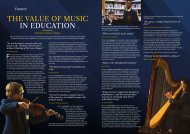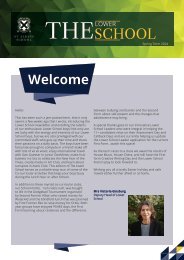Create successful ePaper yourself
Turn your PDF publications into a flip-book with our unique Google optimized e-Paper software.
Hidden Voices<br />
Anti-Semitism in England<br />
1190- The York Massacre:<br />
During the Norman Conquest, the first Jews had<br />
arrived in England. Anti-Semitism had been a<br />
particular feature of the reign of King Stephen and<br />
then Henry II. It is for example believed that in the<br />
time of Henry II was the beginning of the “blood<br />
libel,” in England, which originated the idea that in<br />
religious ceremonies Jews would murder Christian<br />
children. When Richard I became king in 1189, he<br />
caught onto the widespread feeling of pro-Christian<br />
and Anti-Semitic feeling in the country. He<br />
played into this feeling with his plans to personally<br />
go on crusade and with the denial of Benedict of<br />
York (the richest Jew in the land) from attending<br />
his coronation. Anti-Jewish riots occurred across<br />
England in 1190 and this would culminate with the<br />
very worst in York. Rioting in York followed a fire,<br />
in which the local gentry, aiming to wipe out the<br />
A depiction of the York Massacre<br />
excessive debts they owed to the Jewish population,<br />
blamed the Jewish population for the fire. Following<br />
the death of Benedict of York on his way back<br />
from London to York, the Jewish population were<br />
fearful of the rioting. This led them to take refuge<br />
in York castle as they rightly believed that a royal<br />
castle would give them royal protection. However,<br />
due to rumours that the Warden of the Castle was<br />
going to betray them, the Jews inside the castle<br />
chose to lock him out. This led to him request a<br />
local militia capture the castle by force. One of the<br />
nobility, Richard Malebisse, offered safe passage out<br />
of the castle to anyone willing to denounce Judaism<br />
and convert to Christianity. This offer though was<br />
declined and faced with death the 150 Jews inside<br />
the castle made a pact to take their own lives. A few<br />
chose to accept the offer of Malebisse, however he<br />
went back on his offer and decided instead to kill<br />
them. Malebisse then ordered all documents relating<br />
to the money he owed and all records of the<br />
event be destroyed.<br />
59<br />
1290- The Expulsion of the Jews:<br />
Following on from the Magna Carta in 1215 king<br />
John made it clear that the provisions were not to<br />
apply to Jews, they would instead rely on a royal<br />
charter. This essentially meant that the rights of<br />
Jews were down to the king only. Henry III was<br />
particularly anti-Semitic in his policies, for example<br />
he required all Jews to wear badges (the same as<br />
Hitler’s policy) and imposed far higher taxation on<br />
Jews than other subjects. This requirement to wear<br />
a badge was later reinforced again by Henry III in<br />
the Statute of Jewry. In 1275 Edward I then passed<br />
his own Statute of Jewry and to fund his invasion<br />
of Wales this declared that all Jews over 12 would<br />
have to pay taxation and that any money he lent<br />
from the Jews would not be paid back at interest.<br />
This is likely because he never planned on paying it<br />
back, so wanted to ensure there was no time limit<br />
on the money. By 1290 Edward I was deeply in<br />
debt due to his wars in Wales, Scotland and France.<br />
This had an impact on the Jewish population as he<br />
realised by expelling the Jews he could seize their<br />
property and their debts would be transferred to<br />
the crown. However, the financial desires went even<br />
further than this as Edward had to persuade parliament<br />
of a steep tax. Therefore, due to the unpopularity<br />
of the Jews at the time due to the propaganda<br />
spread by the “blood libel,” Edward asked parliament<br />
that in exchange for the tax he would expel


















